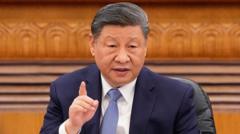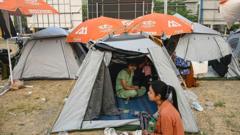A poignant account of Uyghur refugees reveals the emotional turmoil of families separated by detention and the looming threat of being sent back to China, where they face persecution and imprisonment.**
The Plight of Uyghurs in Thailand: Fear of Deportation and Suffering in Detention**

The Plight of Uyghurs in Thailand: Fear of Deportation and Suffering in Detention**
Following their harrowing escape from China, Uyghur families in Thailand face the grim reality of potential deportation, as fears mount over their dire living conditions.**
The ongoing situation of Uyghur refugees in Thailand has drawn significant attention amid fears of deportation back to China. Niluper, a Uyghur mother residing in Turkey, shares the pain of separation from her husband, who remains detained in Thailand. In 2014, her family fled from increasing oppression in Xinjiang, only to find themselves caught up in the Thai immigration system. After being released, she is plagued with anxiety over her husband's potential return to China, which has a notorious history of repressing Uyghurs.
Recent reports indicate that Thai authorities have attempted to secure the consent of Uyghur detainees for their deportation, an act that raises alarms for human rights advocates. While the Thai government denies any immediate plans for deportation, human rights organizations caution that the 48 remaining Uyghur men in custody could be forcibly returned to China at any moment. The uncertainty vastly affects their families abroad, as Niluper's children continue to ask for their father, causing immense emotional distress.
Conditions in the Immigration Detention Centre (IDC) in Bangkok, where the Uyghurs are held, have been described as dire. Overcrowding, unsanitary environments, inadequate food, and limited medical care have led to severe suffering among the detainees. Reports of rashes and skin conditions owing to poor hygiene are common, with many detainees isolated and devoid of contact with the outside world. The Thai government's complicity in these human rights abuses comes amid allegations of China exerting influence over Thailand's treatment of Uyghur asylum seekers.
This tragic narrative continues to be exacerbated by international dynamics. China's pressure on Thailand remains significant, as evidenced by the country's decisions impacting the Uyghur detainees. Historical contexts suggest that Thailand's previous mass deportations led to violent incidents, perhaps underscoring the Thai government's apprehension regarding further actions against these individuals.
Former detainees recount the despair of living under threat and uncertainty. Hassan Imam, now in Turkey, recalls the chilling realization of planned deportations, adding to the collective trauma of those still trapped in Thailand's detention system. As the geopolitical climate shifts, the plight of Uyghur refugees remains a revealing intersection of human rights and international relations, emphasizing the urgent need for comprehensive solutions to protect innocent lives caught in a cycle of despair.
Recent reports indicate that Thai authorities have attempted to secure the consent of Uyghur detainees for their deportation, an act that raises alarms for human rights advocates. While the Thai government denies any immediate plans for deportation, human rights organizations caution that the 48 remaining Uyghur men in custody could be forcibly returned to China at any moment. The uncertainty vastly affects their families abroad, as Niluper's children continue to ask for their father, causing immense emotional distress.
Conditions in the Immigration Detention Centre (IDC) in Bangkok, where the Uyghurs are held, have been described as dire. Overcrowding, unsanitary environments, inadequate food, and limited medical care have led to severe suffering among the detainees. Reports of rashes and skin conditions owing to poor hygiene are common, with many detainees isolated and devoid of contact with the outside world. The Thai government's complicity in these human rights abuses comes amid allegations of China exerting influence over Thailand's treatment of Uyghur asylum seekers.
This tragic narrative continues to be exacerbated by international dynamics. China's pressure on Thailand remains significant, as evidenced by the country's decisions impacting the Uyghur detainees. Historical contexts suggest that Thailand's previous mass deportations led to violent incidents, perhaps underscoring the Thai government's apprehension regarding further actions against these individuals.
Former detainees recount the despair of living under threat and uncertainty. Hassan Imam, now in Turkey, recalls the chilling realization of planned deportations, adding to the collective trauma of those still trapped in Thailand's detention system. As the geopolitical climate shifts, the plight of Uyghur refugees remains a revealing intersection of human rights and international relations, emphasizing the urgent need for comprehensive solutions to protect innocent lives caught in a cycle of despair.





















